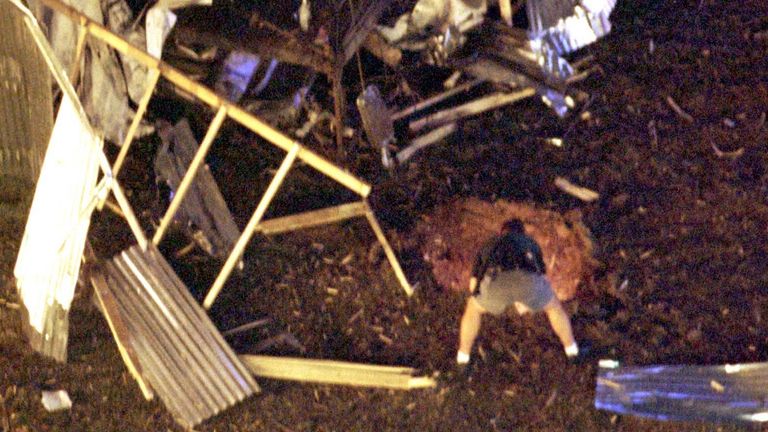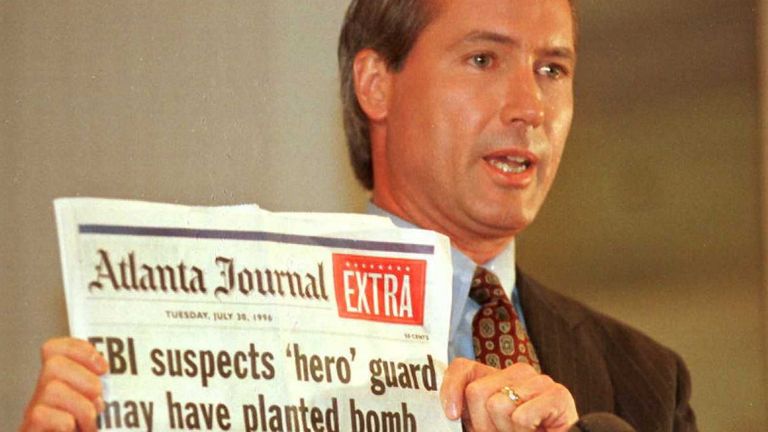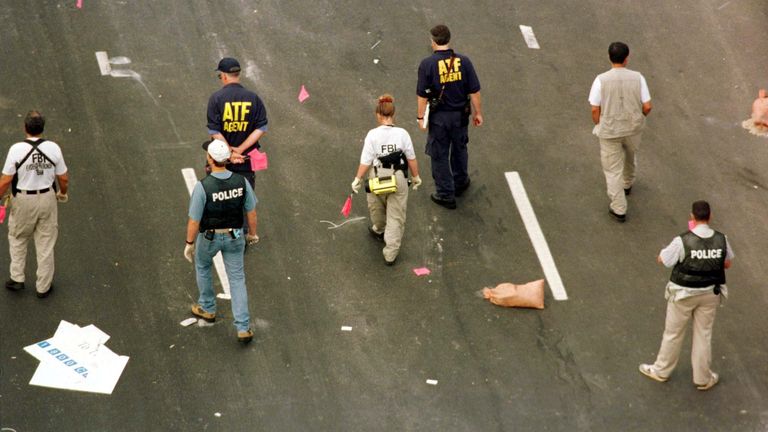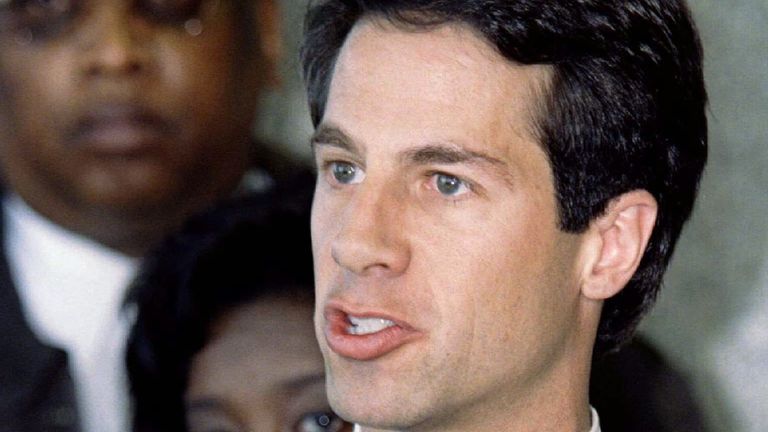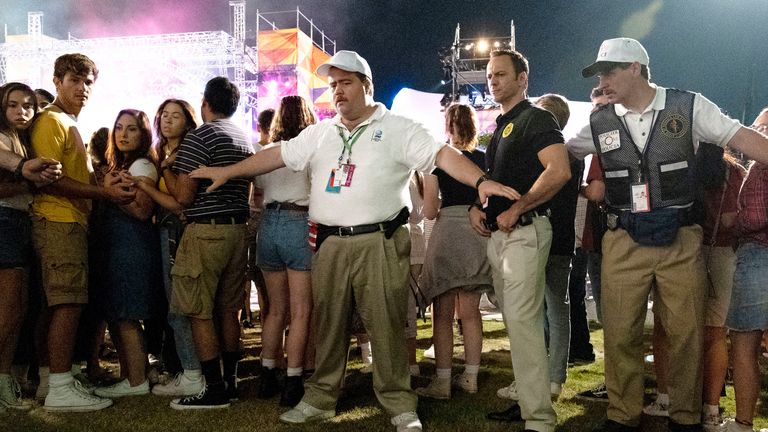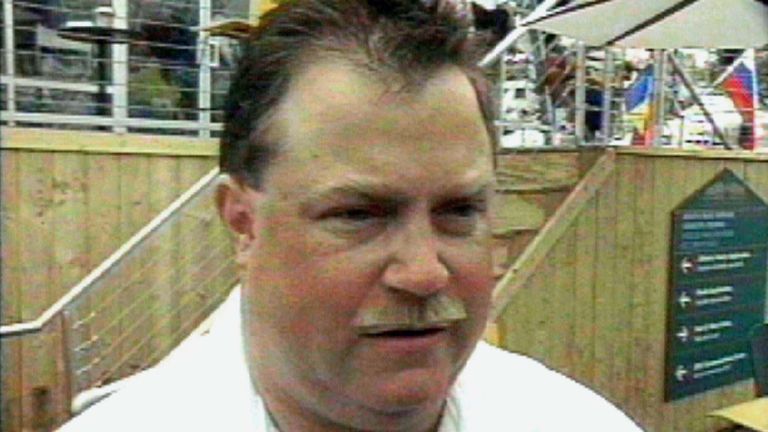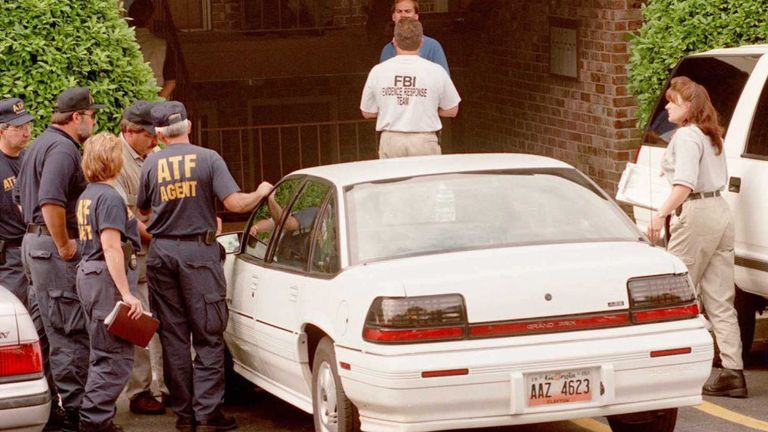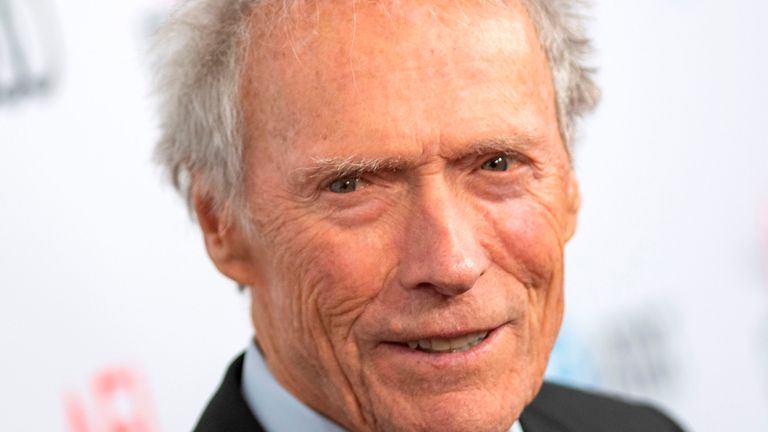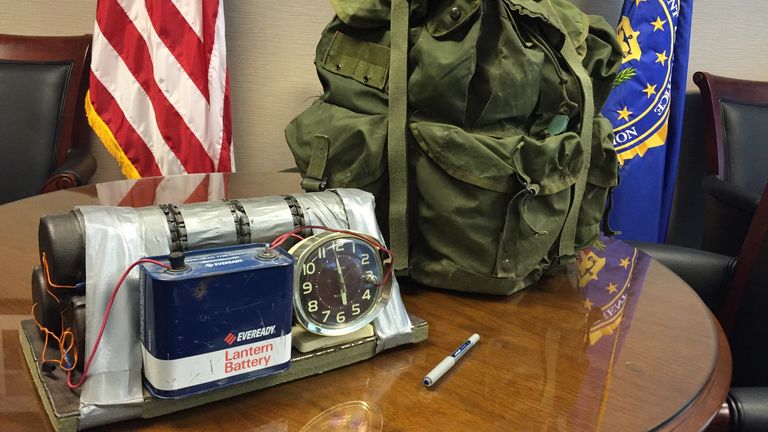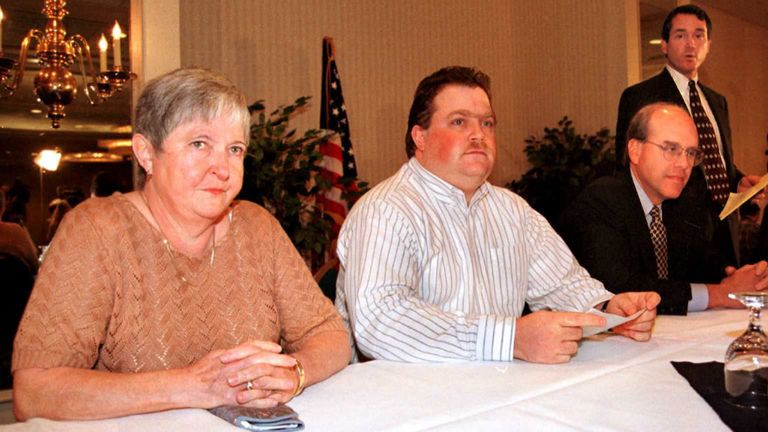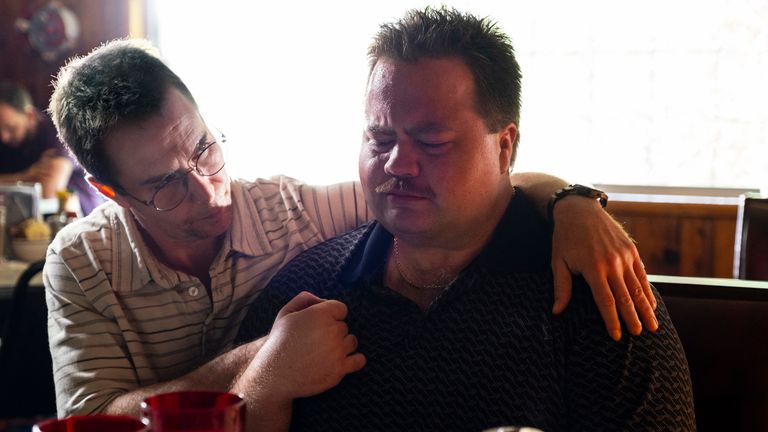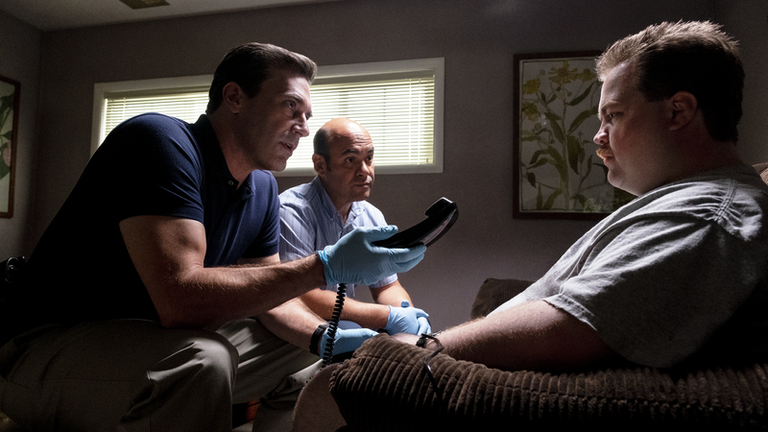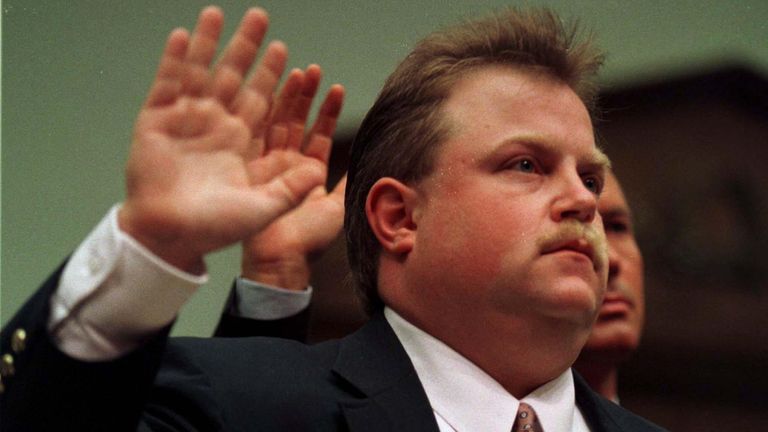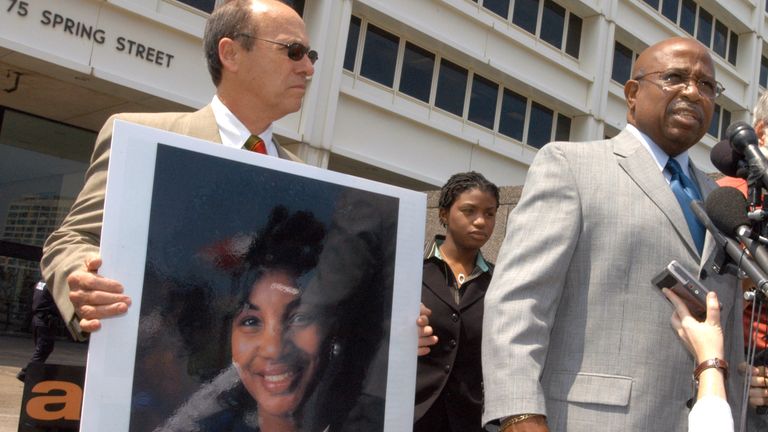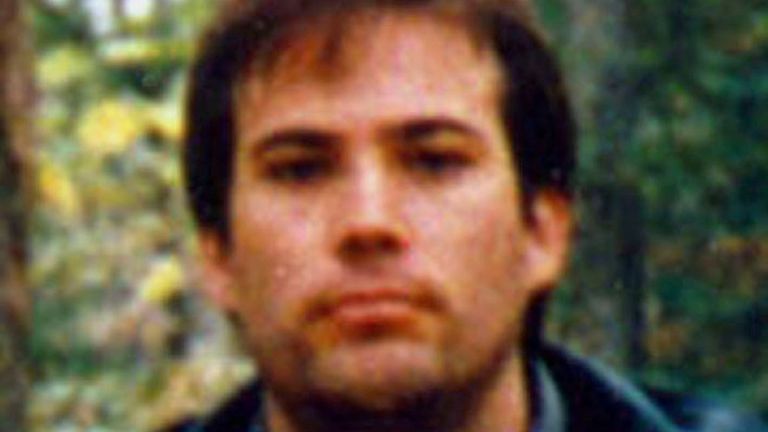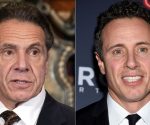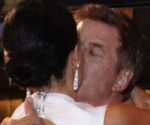Richard Jewell: The 1996 Olympic bomb attack and the hero who became a villain | Ents & Arts News
[ad_1]
In the immediate aftermath of the bomb exploding, security guard Richard Jewell was a hero.
When the 33-year-old discovered the khaki green military-style backpack containing the device – a pipe bomb weighing at least 18kg that would turn out to be the biggest of its kind ever seen by the FBI at the time – he did everything he had been trained to do.
It was 12.55am, Saturday 27 July 1996. In the early hours of that morning, about 50,000 people were gathered at the Centennial Olympic Park in Atlanta, Georgia, celebrating the previous day’s sporting achievements at a concert. With the Olympics in full swing, this might easily have turned out to be one of the worst terror attacks in US history.
After raising the alarm, Jewell, with the help of other guards, began evacuating the immediate area. Unbeknown to him, at 12.58am a 911 warning call had also been made from a payphone: “There is a bomb in Centennial Park. You have 30 minutes.”
But there wasn’t time to stop it.
The bomb exploded near a sound tower at 1.20am, killing one woman, 44-year-old mother Alice Hawthorne, and cameraman Melih Uzunyol, who suffered a heart attack, and injuring more than 100 other victims. If not for Jewell’s quick thinking, the numbers would have been far higher.
Now, the security guard’s story has been dramatised by director Clint Eastwood in the new film Richard Jewell, billed as “a story of what happens when what is reported as fact obscures the truth”.
Because just three days after being hailed a hero, Jewell’s face was splashed across front pages for all the wrong reasons; the FBI was treating him as “a person of interest”.
“FBI suspects ‘hero’ guard may have planted bomb,” the front page of the Atlanta Journal-Constitution (AJC), the first news outlet to carry the story, reported on Tuesday 30 July.
This was a bombing at the Olympics, the biggest story on the planet. The world was demanding to know who was responsible.
The headline wasn’t untrue. The security guard had become a suspect. But it was the start of what Jewell, who always maintained his innocence, would later describe as his “88 days of hell”.
Richard Jewell, the film, presents a David and Goliath-type case: the innocent, hapless security guard who idolised law enforcement and only wanted to do the right thing, versus the FBI and the media, two of the most powerful forces in America.
Jewell was an early example of trial by the court of public opinion before social media even existed. So how exactly did it all go so wrong?
Kent Alexander, the US Attorney for the Northern District of Georgia at the time of the 1996 Olympics, who spent hundreds of hours in meetings with the FBI following the bombing, and Kevin Salwen, who ran the Wall Street Journal’s (WSJ) southeastern section and reported on the story during the Games, unravel the events in their book The Suspect, a source for the film.
“I met Richard Jewell that morning a few hours after the explosion and I shook his hand,” Alexander tells Sky News. “He was still there, at the park, talking to FBI agents, and I heard what he had done so I shook his hand to thank him.”
Had Jewell not spotted the bomb and acted so quickly, he says, there is no doubt many more people would have died.
“Could have been a lot worse? No, it definitely would have been a lot worse,” he says. “That bomb was the largest type of that kind the FBI and the ATF (Bureau of Alcohol, Tobacco, Firearms and Explosives) had ever seen. And it had a directional plate.
“During the course of events which [Jewell] triggered, the plate ended up facing skywards instead of straight out into the crowd. He certainly saved a lot of lives. It was devastating, but it would have been far more devastating.”
In the hours that followed, Jewell, the hero of Centennial Park, appeared on CNN, and took part in other interviews, too. But by the Sunday, the FBI was considering him as a potential suspect.
“You always look at the guy who found the bomb, just like you always look at the guy who found the body,” as one FBI agent says in the film.
Looking into someone close to the crime wasn’t unusual. There was information that needed to be investigated; comments Jewell had made, certain behaviour, a call received about him. Officers wouldn’t have been doing their job properly had they not at least looked into Jewell.
But with the bombing making international news, and Jewell the world’s hero, it had to be handled delicately.
“My thought at the time was wait and see,” says Alexander. “There were already two suspects. So wait and see.
“There was an entire investigative plan in place, to interview Jewell quietly. That went out of the window as soon as his name appeared in the media. Obviously, there was a leak.”
And the leak – whose identity Salwen and Alexander went on to discover and is reported in their book, but is given a fictional identity in the film – must surely have been aware of the consequences?
“I don’t know what was going through his mind,” says Alexander. “But I knew the consequences. I was furious. It was the biggest story in the world at the time.”
Jewell, who had not even been arrested, let alone charged, found himself in the eye of a media storm of which it is hard to overestimate the magnitude, says Salwen.
“This was the largest peacetime event in history: 197 nations, two million visitors to Atlanta, 15,000 journalists in town to cover the Games.
“And 1996 was this really interesting year for the media. CNN was up and running but MSNBC and Fox News went on-air that year. The WSJ and NYT (New York Times) and a number of other US publications went online for the first time. So there was this acceleration in media and a change in news consumption and expectation; immediacy started to take precedent over accuracy.
“When you think about the way we now race to judgement I often think of Richard Jewell as patient one for the virus of social media overreach.”
Like Alexander, Jewell first came to Salwen’s attention as a hero. When it emerged that he was a suspect, the WSJ, he says, took a “careful, wait-and-see perspective” when it came to reporting the progression in the case.
“But I will say that was largely because of decisions made in New York,” Salwen admits. “Our main editor talked us off the ledge. Several of us in Atlanta were very unhappy that we were falling behind on the story.
“Luckily, our editors were far smarter than we were. Caution ended up being the right decision.”
So were the press outlets who reported the suspect status really the archetypal baddies, as they are depicted in Eastwood’s film?
This is where the story is perhaps presented a little too simplistically, with the film showing that Jewell fitted a profile and that authorities were under huge pressure to find the bomber. With the hindsight of knowing his innocence, it is easy to present the authorities and media as if they were out to get him.
Reporting that Richard Jewell was suspected of committing the crime is of course very different to reporting that Richard Jewell did commit the crime. Legally in the US, what was reported was okay because it was true.
But mud sticks.
“In the US, with libel law, truth is essentially the ultimate defence,” says Salwen. “Richard Jewell was in fact the lead suspect, so you could legally report that. But I’ve spent a lot of time speaking to journalism classes and I say that if you’re just settling for the libel benchmark you’re appealing to the lowest common denominator.
“In this case I would say that yes, the facts were accurate. But the broader truth was not necessarily accurate. Richard Jewell was not the bomber. Richard Jewell was never arrested. Richard Jewell was never charged. And he certainly wasn’t convicted.
“The danger of dropping that information into the public court of opinion in Richard Jewell’s case was truly disruptive.”
Richard Jewell died of a diabetes-related heart attack 11 years after the bombing, in August 2007. He was 44.
“You could make the argument that it was the suspect status and media coverage that hastened his death,” says Salwen. “He certainly had undiagnosed PTSD.”
It wasn’t long after the bombing before it became apparent, both Alexander and Salwen say, that Jewell was unlikely to have been responsible. But it would be months before he was officially exonerated.
“It took so long for three reasons,” says Alexander. “Firstly, there was an investigation to be conducted on the unusual things Richard Jewell had said and done. For instance, he took his first break away from the tower on the night the bomb was placed. He had asked if another tower would withstand a blast. He told others at the park to take a picture of him because ‘I’m going to be famous’. All that had to be investigated.
“Second, the FBI needed to investigate all the new leads. When someone’s name is out in public – in today’s world like going viral – you get a lot of calls from all over the country, all over the world, even. Calls to say people have heard horrible things Jewell had done, and seen him using explosives and trying to buy more. All of those had to be traced and investigated. None panned out.
“Finally, Richard Jewell was understandably reluctant to speak with the FBI again. By late September we had questions that only Richard Jewell could answer: Where was his green backpack that closely resembled the one holding the Olympic bomb, but was never found in searches of his property? Why did he ask such strange questions? Why did he so strongly resist being transferred away from the tower a few days before the bombing?”
After weeks of suspicion, and headlines – but no charges – Jewell’s mother, Bobi, issued an appeal to then president Bill Clinton to have the FBI drop the investigation, breaking down in tears at a news conference.
Alexander worked with Jack Martin, Jewell’s criminal defence attorney, to encourage the security guard to meet with the FBI once again.
“On 6 October, Richard Jewell came in with Jack Martin and met with an FBI agent and others for six hours,” he says. “They asked him every question remaining. The deal from there was they would have three weeks to investigate further, based on his answers, and by then we would know if he was still considered target of the investigation.”
On 26 October 1996, Alexander took the unusual step of publicly exonerating Jewell, even though he had never been charged, delivering a letter to Martin.
Jewell went on to file law suits against the news outlets he accused of libelling him.
These included NBC, CNN and the New York Post, which settled, and the AJC, which did not. The case against the AJC was eventually dismissed in 2011, four years after Jewell’s death and 10 years after the death of the reporter who wrote the story, Kathy Scruggs.
The Court of Appeals concluded that “because the articles in their entirety were substantially true at the time they were published – even though the investigators’ suspicions were ultimately deemed unfounded – they cannot form the basis of a defamation action”.
The AJC had been vindicated. So when Richard Jewell, the film, was released in the US in November 2019, it was shrouded in controversy, with the AJC seeking public acknowledgement and a “prominent disclaimer” admitting that “some events were imagined for dramatic purposes”.
The paper said it took “particular exception” to the film’s portrayal of the late Scruggs, and the suggestion that she slept with an FBI agent to get what a recent AJC report looking back at Jewell’s story describes as “the biggest scoop of her career”.
The backlash over Scruggs’ portrayal has dominated headlines surrounding the film, somewhat overshadowing the story of Jewell himself.
In an interview with Sky News promoting the film, Paul Walter Hauser, who plays Jewell, addressed the controversy.
“I guess my realistic take on the Kathy Scruggs controversy is I’m not a historian of Richard Jewell or Kathy, I was a historian of the screenplay and just trying to tell the story. What I would say is if people are frustrated by that element I hope it doesn’t take away from the overall impact of what we’re trying to right, the wrongs we’re trying to right, in the movie we’re telling.
“And I would also say that Hollywood in general, whether you’re watching a movie [based on a true story] like Foxcatcher or Spotlight, there are composite characters, there are elements where you can’t know the exact truth.
“There is no exactitude when two of your leads have since passed – Kathy and Richard. We did our best and I’m very proud of it.”
Both Salwen and Alexander met Scruggs and interviewed a lot of sources connected to her for their book. She was an “extremely divisive force”, a woman who was “larger than life, incredibly entertaining as a character to write; she dressed provocatively, drank a lot, smoked a lot, used profanity a lot”, says Salwen. “She kept a gun in her purse next to her perfume. And she had a reputation – because of the way she dressed and the way she comported herself – of sleeping with her sources.
“That said, we never say that she did sleep with her sources and we certainly didn’t say she slept with an FBI agent to get this story. We asked everyone we interviewed, specifically: who did she sleep with? What do you know versus rumour?
“As one source summed it up well: Kathy sold the sizzle and not the steak. In other words, she didn’t sleep with these people, she was just a great flirt. There’s a leap to go from there to saying she slept with her sources.
“The film… goes beyond where we were. But the rest of the portrayal of Kathy Scruggs is accurate.”
Both Alexander and Salwen say they enjoyed the film.
“I think the movie is terrific and I don’t say this just as I was involved in it,” says Salwen. “I think it’s a really fun piece of entertainment that makes a strong point about how we as a society often rush to judge. It’s a great biopic of an unsung hero.”
“It’s a movie, it has different characters and it changes things a bit but generally they did a really good job,” says Alexander, who says he was pleasantly surprised to see his signature make a cameo when the exoneration letter is delivered on screen.
Salwen, grateful that his own editors talked him down from the same story as Scruggs, says Jewell’s story encouraged a lot of thought among journalists in the aftermath.
When it comes to reporting, just because it is legally sound it doesn’t always make it right, he says.
“So much of the coverage that happened afterwards was just awful,” he says. “Jewell was called the ‘Village Rambo’ and ‘a failed, fat sheriff’s deputy’. On Jay Leno, The Tonight Show, he was referred to as the ‘Una Doofus’ (in a reference to terrorist Ted Kaczynski, known as the Unabomber).
“He was compared to Shawn Eckardt, the guy who attacked [ice-skater] Nancy Kerrigan.” (Eckardt, coincidentally, was played by Hauser in the film I, Tonya in 2017).
“Leno held up pictures of both and said, ‘What is it about the Olympics that brings out the fat, stupid guys?’
“In the court of public conviction, Richard Jewell did the crime.
“Fast-forward to today and you see it so often now with our current social media behaviour. People retweet things without even checking.”
So what’s the answer?
“The reality is, as a society we absolutely need to slow down and recognise that certain things are not knowable right away,” says Salwen. “Things can just take time.
“We’re all publishers now. If you have Instagram, Facebook, Twitter, you’re in the publishing business. And if you’re posting without checking, you’re part of the problem. And I include myself in this, by the way. I’m not always as slow and mindful as I could be.
“We as a society rush to judgement and the person on the other end is the human toll.”
Another journalist, Henry Schuster, who was a producer for CNN at the time of the bombing and arranged Jewell’s first interview as a hero, agrees. In an open and honest article for the Washington Post – “I helped make Richard Jewell famous – and ruined his life in the process” – he describes the apology he left it too late to make.
Schuster politely declined to comment further, saying he had said everything he wanted to in his article, but was happy for it to be quoted.
Law enforcement sources were leaking to several media outlets, not just the AJC, that Jewell was under investigation, he says.
“Instead of going with the more neutral language we favoured, [CNN president Tom] Johnson had the anchors on set hold up the front page of the Journal and read the headlines.
“By the time Jewell’s lawyer heard the news reports and managed to get through the FBI switchboard to his client, telling him to get out of the field office, the collective weight of law enforcement and the media had begun turning Jewell from a hero to a villain.”
Writing about “making sense of it all these years later, when I have an Emmy on my shelf for CNN’s coverage from those first 24 hours”, Schuster concludes: “We in the media got it wrong, even though our reporting was right. There’s the paradox: Jewell really was the FBI’s main suspect. Yes, the FBI has a lot to answer for, but this is about our responsibility.
“Suppose that CNN had been more nuanced and called Jewell a person of interest; our repetitive and relentless coverage would still have made it look like the authorities thought he was the culprit.
“In my own reporting, I’ve learned to be more sceptical of sources, especially when they claim to speak for government – especially at its highest levels. My stories these days don’t go to air without relentless fact-checking, and my scripts have more footnotes than any term paper I did in college.
“But the lesson is, that isn’t always enough. It’s also how you report it and how everyone else is reporting it, too. Someone else’s guilty plea and several court settlements didn’t give Jewell his good name back. Maybe the film finally will.”
NBC correspondent Tom Brokaw also apologised for his coverage in a tweet posted in December, saying he “deeply” regrets what Jewell and his mother went through, and said: “I hope we all learned a lesson, including the FBI which was my principal source.”
Law enforcement also got things wrong, says Alexander.
“First and foremost, there was a leak. Leaks like that should be criminalised. Second there was confirmation bias, although it wasn’t called that at the time. A profile suggested Jewell was the likely bomber and too much of the investigation centred on trying to prove that conclusion was correct. That said, hindsight is of course 20-20.”
The bomber turned out to be 29-year-old Eric Rudolph, who went on to commit three further attacks against abortion clinics and a gay bar in Georgia and Alabama in the two years that followed before he was identified in 1998. It would be five more years until he was caught.
The timing of the payphone warning of the bomb, it was realised fairly early in the investigation, meant Jewell couldn’t possibly have made the call. In fact, it was an AJC journalist who spent the time working out the timings and realising they couldn’t work, and reported the story.
However, when it came to the content of the call, the audio was never released by the FBI to the public.
“This isn’t a grand epiphany or anything but one thing I would have done differently is push even harder for the 911 call that had been made warning of the bombing to be released,” says Alexander. “The decision was made not to publicise and it was a missed opportunity at the time.
“Had the FBI played that tape during the broadcasts of the Olympic Games there’s a pretty good chance someone in the public would have recognised Eric Rudolph’s voice.
“If Eric Rudolph had been found then, there are three more bombings that wouldn’t have happened.”
And Richard Jewell may have remained the true hero he always was.
More than 20 years later, in the digital age, the story of the security guard who went from unknown to global hero to public enemy in the space of a few days feels perhaps even more relevant now.
So how do we reverse the world’s relentless thirst for immediate information?
“I think we really need to think about – and I say this as a journalist, as someone who’s absolutely a defender of the freedom of the press – maybe we need to take a hard look at changing our laws in the US,” says Salwen.
“Maybe we need to protect people a little more than we have been.”
Richard Jewell stars Paul Walter Hauser in the titular role, alongside Jon Hamm as the lead FBI investigator, Sam Rockwell as Jewell’s attorney, Olivia Wilde as AJC reporter Kathy Scruggs and Kathy Bates, who has been nominated for an Oscar, as Jewell’s mother. It is out in UK cinemas now
The Suspect: An Olympic Bombing, the FBI, the Media, and Richard Jewell, the man caught in the middle, by Kent Alexander and Kevin Salwen, is also available to buy now
[ad_2]
Source link






